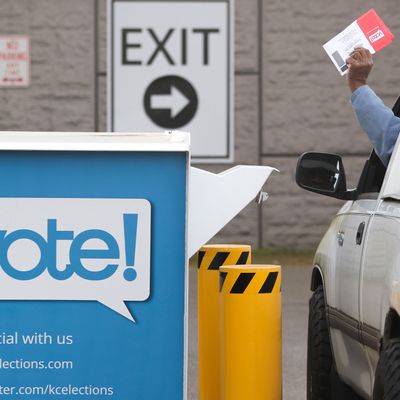
The refusal of congressional Republicans (and/or the Trump administration) to allow robust federal assistance to state and local election authorities, tied to a mandate for safer in-person and expanded by-mail voting by November, was one sign of the battle to come. Another is occurring in states that have yet to hold 2020 primaries where Democrats are fighting for maximum voting opportunities and (most) Republicans are screaming about “voter fraud” — when they aren’t admitting they just prefer lower turnout. As Politico’s Alex Isenstadt explains, the Trump campaign is committing every available resource to restricting the franchise, and Democrats are battling back. It’s a political and legal guerrilla war that will take place in courts and state legislative and executive offices all across the land as the general election approaches, particularly if voters still fear infection by the the coronavirus:
President Donald Trump’s political operation is launching a multimillion-dollar legal campaign aimed at blocking Democrats from drastically changing voting rules in response to the coronavirus outbreak. In the past several weeks, [Trump’s] reelection campaign and the Republican National Committee have helped to oversee maneuvering in a handful of battleground states with an eye toward stopping some Democratic efforts to alter voting laws, and to bolster Trump. The mobilization is being closely coordinated with Republicans at the state and local levels.
This framing of the battle shows the big advantage Republicans have: They are defending the status quo while Democrats want to “drastically” change voting rules. But the pandemic, of course, has “drastically” changed the already questionable systems that make voting inconvenient — especially for people who work on inflexible job schedules or young people who tend to move a lot — and made voting by mail a lot safer and more logical. But everywhere it has been introduced, widespread no-excuse voting by mail has boosted turnout significantly, and Republicans (as Trump himself recently admitted) know they do better when fewer people can participate in America’s democracy.
And so the GOP, almost everywhere, will fight to stop change or vitiate it as much as possible, as Politico’s Isenstadt highlights:
In Pennsylvania, where Democrats proposed an entirely vote-by-mail system, Trump advisers worked with the Republican-controlled Legislature to push through more circumscribed rules. They include a limited expansion of absentee voting and changes to the handling and counting of those ballots.
In Georgia, some officials are recommending sending everyone a ballot, also a no-go for Trump’s team. The president’s advisers instead advocated mailing people applications they would need to fill out and return in order to receive a ballot. The idea was approved by Georgia’s Democratic Party and Republican secretary of state.
Actually, Georgia Republicans are split on mailing out applications to all voters, with some opposing the very idea of voting by mail as illegitimate, and others believing they can take advantage of the proposed new system by aggressively promoting the return of ballots by their own voters. They are united, of course, in opposing any measure that would cut out a step by mailing actual ballots to all voters as is done in five states (with five others letting voters permanently register to regularly receive mail ballots).
But Isenstadt’s right that the particular GOP strategy for holding down voting opportunities will vary state to state. Everywhere, they will argue that Democrats are trying to enable fraud (without any evidence to suggest it actually exists), or that innovations like voting by mail are just too new and unusual (though they are widely utilized in all sorts of different states).
We got a preview of some of the GOP arguments against voting by mail in 2018, when congressional Republicans blamed their big losses in California on voting rules that allowed acceptance of mail ballots postmarked by Election Day but received later, which in turn slowed down the count. It generated quite the conspiracy theory as Speaker Paul Ryan, and later his successor as Republican leader, Kevin McCarthy, pretended to believe the slow count — which reversed early Republican leads — somehow indicated, without any evidence, that ballot-box tampering had occurred. It’s hard to imagine any place in America where early leads with partial returns are invulnerable to later reversals, but somehow Ryan and McCarthy deemed the Election Night results as sacrosanct.
Another argument we will hear bruited about is that Democrats want to cast vast numbers of illegal mail ballots via a practice the GOP calls “ballot harvesting,” which simply means allowing people to pick up signed and sealed mail ballots and give them to election officials (Democratic proponents call it “community ballot collection”). Yes, of course, that would make it easier for agents of a particular political persuasion to ensure “their” voters’ ballots get cast and counted, but tampering with the ballot remains a felony in California — the state most famous for allowing third-party collection. Other states limit ballot collection to family members, but nowhere is there evidence that this “harvesting” swings elections.
In some places, Republicans may actually go along with expansion of voting opportunities, so long as it benefits their own bottom line, like automatically sending absentee-ballot applications to voters 65 and older — who Trump carried 52-45 in 2016, according to exit polls.
In truth, the rules are going to depend on the power of one party or the other to control the decision-making process in the 50 states, via persuasion in the courts or brute political strength. But the closer we get to November, and the longer the coronavirus pandemic lasts, the more likely it is that a pro-GOP status quo will prevail.






























